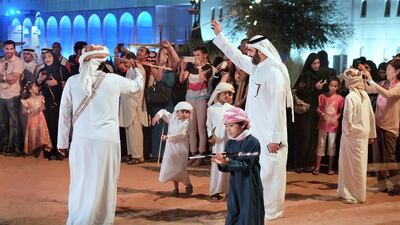ABU DHABI // About 120,000 people attended the 11-day Qasr Al Hosn Festival, which ended on Saturday.
Guests had the opportunity to revive memories of heritage with friends and family as they celebrated years of Emirati identity in a setting that narrated the development of Abu Dhabi.
Qasr Al Hosn, the symbolic birthplace of Abu Dhabi and a valuable monument of Emirati traditional heritage, offered cultural and traditional activities.
The Qasr Al Hosn Fort – the oldest building in Abu Dhabi – dates back to the mid 18th century, and for generations housed Abu Dhabi’s Ruling family.
The festival, organised by Abu Dhabi Tourism & Culture Authority, is held annually to celebrate the fort, UAE identity and Abu Dhabi’s traditions and culture.
“The influx of visitors to the Qasr Al Hosn Festival over the past 11 days reflects the importance of the fort to the people of Abu Dhabi and the UAE as a symbol of our history,” said Sheikh Sultan bin Tahnoon, chairman of the authority.
“The festival was a unique opportunity for us to celebrate our cultural heritage, and bring it to life in an interactive setting that combines the traditional with the modern.
“Visitors were able to enjoy a fully immersed experience of the Emirati traditional lifestyle.”
newsdesk@thenational.ae

